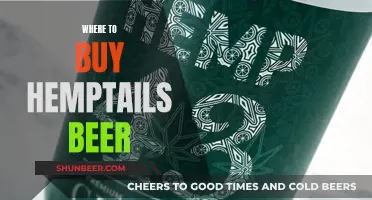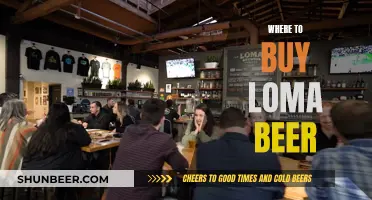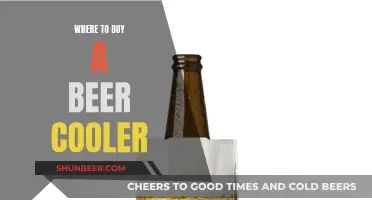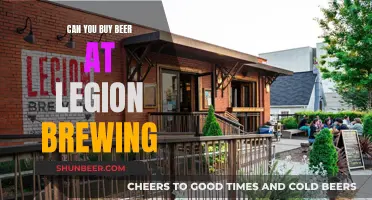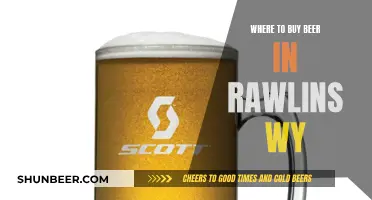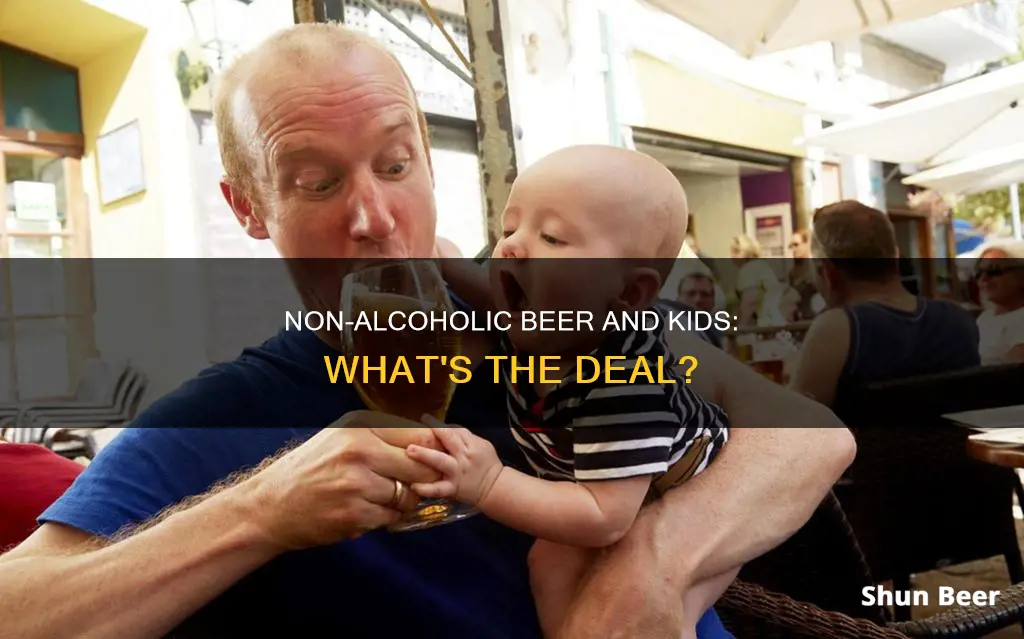
Non-alcoholic beer is a beverage that contains little to no alcohol, typically defined as having less than 0.5% alcohol by volume (ABV). While it is marketed as a non-alcoholic drink, it may still contain trace amounts of alcohol. The laws regarding the sale of non-alcoholic beer to minors vary across different regions and countries. In the United States, for example, some states require individuals to be 21 years old to purchase non-alcoholic beer, while other states do not have any age restrictions. In the United Kingdom, on the other hand, there is no age limit for purchasing drinks with less than 0.5% ABV, which includes non-alcoholic beer. The varying laws and regulations regarding the sale of non-alcoholic beer to minors exist due to concerns about promoting alcohol to minors and the potential for indirect promotion of alcoholic products.
What You'll Learn
- Non-alcoholic beer may contain trace amounts of alcohol
- In the US, drinks with less than 0.5% ABV are legally non-alcoholic
- In the UK, drinks with less than 0.05% ABV are legally non-alcoholic
- Retailers restrict the sale of non-alcoholic beer to minors to avoid promoting alcohol to children
- Retailers also restrict the sale of non-alcoholic beer to make it easier to enforce rules regarding alcoholic drinks

Non-alcoholic beer may contain trace amounts of alcohol
Non-alcoholic beer is often marketed as a healthier alternative to alcoholic beer, and in some cases, as a drink that can be consumed by those under the legal drinking age. However, it is important to note that non-alcoholic beer may still contain trace amounts of alcohol.
In the United States, beverages containing less than 0.5% alcohol by volume (ABV) are legally considered non-alcoholic. This means that non-alcoholic beers can contain up to 0.5% ABV. While this amount of alcohol is not enough to cause intoxication, it is still alcohol, and consuming too much can lead to a positive alcohol urine or breath test. Additionally, the actual alcohol content of non-alcoholic beers may be higher than what is listed on the label. One study found that 29% of no- or low-alcohol beers tested had higher alcohol levels than indicated on their labels, with some containing over 1% alcohol.
The amount of alcohol in non-alcoholic beer can vary depending on the brand and brewing process. Some non-alcoholic beers, such as O'Doul's, contain up to 0.4% ABV per serving, while others, like Athletic Brewing Co., label their products as containing less than 0.5% ABV. Even big brands like Heineken 0.0, Budweiser Zero, and Guinness 0.0, which market themselves as alcohol-free, may contain trace amounts of alcohol.
The presence of alcohol in non-alcoholic beer has legal implications, especially for minors. While the laws vary by state, many states do not have an age limit for the purchase of non-alcoholic beer. However, some states, such as Pennsylvania, prohibit the sale of non-alcoholic beers to persons under the age of 21. Additionally, some retailers choose not to sell non-alcoholic beer to minors, even if it is not legally required.
The reasoning behind restricting the sale of non-alcoholic beer to minors is twofold. Firstly, it is generally agreed upon that alcohol should not be made available to minors. Secondly, non-alcoholic beer looks and tastes similar to alcoholic beer, and it is produced by companies that also make alcoholic drinks. Therefore, allowing minors to purchase non-alcoholic beer could potentially encourage or normalize underage drinking.
UAE Beer Buying Guide: Where to Purchase Legally
You may want to see also

In the US, drinks with less than 0.5% ABV are legally non-alcoholic
In the United States, beverages containing less than 0.5% alcohol by volume (ABV) were once legally defined as non-alcoholic under the now-defunct Volstead Act. Due to its low alcohol content, non-alcoholic beer can be sold to people under the age of 21 in many American states. However, some states, such as Pennsylvania, prohibit the sale of non-alcoholic beers to those under 21.
The legal definition of non-alcoholic beverages varies across different regions. In the United Kingdom, for example, the government recommends using specific descriptions for "alcohol substitute" drinks, including alcohol-free beer. Drinks with no alcohol or alcohol-free are defined as containing not more than 0.05% ABV, while drinks labelled as dealcoholized contain over 0.05% but less than 0.5% ABV. In the European Union, beer must contain no more than 0.5% ABV to be labelled as "alcohol-free."
The classification of non-alcoholic drinks has implications for their sale and consumption, particularly for minors. While the legal drinking age in the US is 21, the specific laws and restrictions regarding the sale of non-alcoholic beverages to minors vary across states. In states such as Texas, Minnesota, Wisconsin, New Jersey, Illinois, Alaska, and Hawaii, individuals under 21 are permitted to purchase and consume non-alcoholic beer. However, other states, including California and Pennsylvania, may still require age verification and restrict the sale of non-alcoholic beverages to minors.
The varying legal definitions and restrictions on non-alcoholic beverages can lead to confusion for consumers and retailers. While the US federal law and many other countries consider 0.5% ABV as non-alcoholic, some regions, such as the UK, have different thresholds for labelling and licensing. This discrepancy can impact the availability and accessibility of these beverages, particularly for minors and individuals who are abstaining from alcohol.
Buying Beer: Legal Hours and Restrictions
You may want to see also

In the UK, drinks with less than 0.05% ABV are legally non-alcoholic
The Licensing Act 2003, Section 191 defines what is classed as alcohol, stating that alcohol means spirits, wine, beer, cider, or any other fermented, distilled, or spirituous liquor, but does not include alcohol of a strength not exceeding 0.5% at the time of the sale or supply in question. This means that an alcohol-free drink must be 0.05% ABV or below.
The Portman Group's voluntary Code of Practice on the Responsible Naming, Packaging, and Promotion of Alcoholic Drinks also covers non-alcoholic products. It states that if a drink below 0.5% ABV shares the same brand or branding, or is a variant of a drink that is subject to the Code, then it is the view of the Advisory Service that the spirit of the Code will apply in the same way to that product.
The UK's definition of an alcohol-free drink could change, with the government currently consulting on new regulations for low-alcohol drinks labelling. The current guidance suggests that the term alcohol-free should only be applied to a drink from which the alcohol has been extracted if it contains no more than 0.05% ABV. However, some members of the alcohol manufacturing and retail industries have argued that this threshold is too restrictive and puts English producers at a competitive disadvantage.
The physical removal of alcohol to a strength no greater than 0.05% ABV is complex and requires significant investment in equipment. Many smaller producers say that they lack the resources to manufacture products at this strength. A number of producers have indicated that increasing the alcohol-free threshold to 0.5% ABV would provide more flexibility and potentially lead to greater diversity and choice in the market.
In summary, while drinks with less than 0.05% ABV are legally non-alcoholic in the UK, most retailers will still restrict their sale to under-18s. The government is currently considering changes to the labelling regulations, which may result in an increase in the threshold for what is considered an alcohol-free drink.
Best Places to Buy Hill Farmstead Beer
You may want to see also

Retailers restrict the sale of non-alcoholic beer to minors to avoid promoting alcohol to children
Non-alcoholic beer is often treated the same as regular beer by retailers, pubs, and bars, meaning that minors are restricted from purchasing it. This is surprising to many, as one might assume that anyone should be able to buy a drink that contains little to no alcohol. However, retailers have their reasons for this restriction, which primarily revolve around avoiding the promotion of alcohol to minors and making it easier to enforce rules regarding alcoholic drinks.
Firstly, while non-alcoholic beer may contain little to no alcohol, its packaging and appearance are almost identical to that of regular beer. Additionally, many non-alcoholic beers are produced by companies that also produce alcoholic drinks. Promoting these "alcohol substitute" drinks to minors could indirectly promote similar products that do contain alcohol. Retailers want to avoid giving the impression that they are permitting minors to purchase products that resemble or are associated with alcoholic drinks.
Secondly, treating non-alcoholic drinks the same as alcoholic ones makes it easier for retailers to enforce rules regarding alcohol sales. This is especially relevant in pubs and bars, where owners are responsible for what customers are drinking on the premises. It can be challenging for staff to distinguish between customers drinking alcohol and those drinking non-alcoholic products, so treating them the same simplifies enforcement and reduces the risk of accidentally serving alcohol to minors.
While selling non-alcoholic beer to minors is not illegal in most regions, retailers voluntarily restrict these sales to protect children from the potential dangers of alcohol and to avoid indirectly promoting alcoholic drinks to minors. This approach is supported by various organisations, such as AB-Inbev and the Portman Group, which have policies regarding the promotion and sale of non-alcoholic drinks to minors.
Trillium Beer: Where to Buy and What to Know
You may want to see also

Retailers also restrict the sale of non-alcoholic beer to make it easier to enforce rules regarding alcoholic drinks
In many countries, non-alcoholic beer is treated the same as regular beer by retailers, pubs, and bars. This means that they will not sell it to anyone who cannot prove they are over the legal drinking age. This is despite the fact that non-alcoholic beer typically contains less than 0.5% ABV (alcohol by volume) and is therefore not legally considered "alcohol" in most regions.
There are two main reasons why retailers restrict the sale of non-alcoholic beer:
- To avoid promoting alcohol to children: Non-alcoholic beer may not contain much alcohol, but its packaging and taste are very similar to regular beer. Many non-alcoholic beers are also produced by companies that make regular beer. Therefore, allowing minors to buy non-alcoholic beer could indirectly promote alcoholic drinks to them.
- To make it easier to enforce rules regarding alcoholic drinks: The packaging of non-alcoholic beer is almost identical to that of regular beer. This can make it difficult for staff to distinguish between customers who are drinking alcohol and those who are not, especially in pubs and bars. Restricting the sale of non-alcoholic beer to minors helps retailers and bar owners ensure that they are complying with alcohol laws and not serving alcohol to minors by mistake.
In some places, such as Texas, Minnesota, Wisconsin, New Jersey, Illinois, Washington D.C., Alaska, and Hawaii in the United States, there are no age restrictions on the purchase of non-alcoholic beer. However, in other places, such as California and Pennsylvania, minors will not be served non-alcoholic beer in most establishments.
Ginger Beer Brand Crabbies: Where to Buy?
You may want to see also
Frequently asked questions
No, minors cannot buy non-alcoholic beer. While drinks with less than 0.5% ABV are not legally considered "alcohol" in many places, non-alcoholic beer is often treated the same as regular beer by retailers and bars due to its similar packaging and to avoid promoting alcohol to children.
Non-alcoholic beers contain trace amounts of alcohol, up to 0.5% ABV, because all the alcohol is removed in the final step of the brewing process.
In the US, the laws regarding the sale of non-alcoholic beer to minors vary by state. For example, in Texas, Minnesota, Wisconsin, New Jersey, Illinois, Washington D.C., Alaska, and Hawaii, minors can buy non-alcoholic beer. In other states, such as California and Pennsylvania, they cannot. In the UK, drinks with less than 0.5% ABV are not subject to the same restrictions as alcoholic beverages, so minors can buy them.


